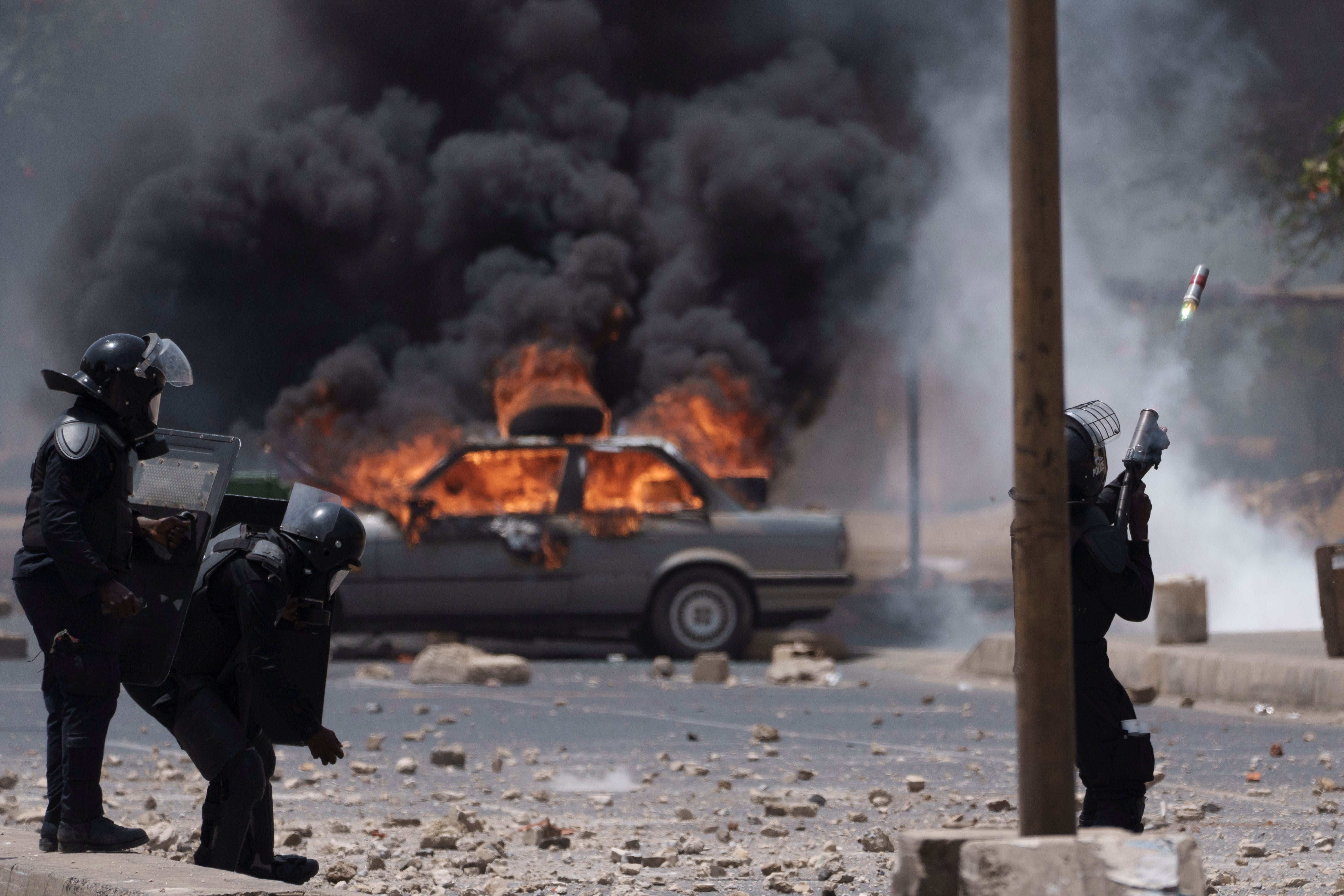Clashes in Senegal leave at least 9 dead; government bans use of social media platforms
Senegal's government says that at least nine people have been killed in violent clashes between police and supporters of opposition leader Ousmane Sonko

Your support helps us to tell the story
From reproductive rights to climate change to Big Tech, The Independent is on the ground when the story is developing. Whether it's investigating the financials of Elon Musk's pro-Trump PAC or producing our latest documentary, 'The A Word', which shines a light on the American women fighting for reproductive rights, we know how important it is to parse out the facts from the messaging.
At such a critical moment in US history, we need reporters on the ground. Your donation allows us to keep sending journalists to speak to both sides of the story.
The Independent is trusted by Americans across the entire political spectrum. And unlike many other quality news outlets, we choose not to lock Americans out of our reporting and analysis with paywalls. We believe quality journalism should be available to everyone, paid for by those who can afford it.
Your support makes all the difference.Clashes between police and supporters of Senegalese opposition leader Ousmane Sonko left nine people dead, the government said Friday, with authorities issuing a blanket ban on the use of several social media platforms in the aftermath of the violence.
The deaths occurred mainly in the capital, Dakar, and Ziguinchor in the south, where Sonko is mayor, Interior Minister Antoine Felix Abdoulaye Diome said in a statement.
Some social media sites used by demonstrators to incite violence, such as Facebook, WhatsApp and Twitter have been suspended, he said.
“The state of Senegal has taken every measure to guarantee the safety of people and property. We are going to reinforce security everywhere in the country,” Diome said.
Sonko was convicted Thursday of corrupting youth but acquitted on charges of raping a woman who worked at a massage parlor and making death threats against her. The court sentenced Sonko to two years in prison. He didn't attend his trial in Dakar, and was judged in absentia. His lawyer said a warrant hadn't been issued yet for the politician’s arrest.
Sonko came in third in Senegal’s 2019 presidential election and is popular with the country’s youth. His supporters maintain his legal troubles are part of a government effort to derail his candidacy in the 2024 presidential election.
Sonko is considered President Macky Sall’s main competition and has urged Sall to state publicly that he won't seek a third term in office.
Corrupting young people, which includes using one’s position of power to have sex with people under the age of 21, is a criminal offense in Senegal that is punishable by up to five years in prison and a fine of up to more than $6,000.
Under Senegalese law, his conviction would bar Sonko from running in next year’s election, said Bamba Cisse, another defense lawyer.
“The conviction for corruption of youth hinders his eligibility, because he was sentenced in absentia, so we can’t appeal,” Cisse said.
However, the government said that Sonko can ask for a retrial once he is imprisoned. It was unclear when he would be taken into custody.
Shortly after the verdict was announced Thursday, clashes erupted throughout the country with Sonko’s PASTEF party calling for people to take to the streets.
In Dakar, protesters threw rocks, burned vehicles and in some places erected barricades while police fired tear gas. Plumes of black smoke and the sound of tear gas being fired were seen and heard throughout the city. Those who weren't protesting stayed indoors, leaving much of Dakar a ghost town with boarded-up shops and empty streets as people feared the violence would escalate.
“The verdict cements the criticism that Sall’s government is weaponizing the judiciary to eliminate prominent rivals that could shake his rule,” said Mucahid Durmaz, senior analyst at global risk intelligence company Verisk Maplecroft.
“Despite being presented as a beacon (of) democracy, the Sonko cases demonstrate the structural issues Senegal grapples with. The court decision and the prospect of Sall’s bid for a third term in the election next year will fuel fierce criticism around erosion of judicial independence and democratic backsliding,” Dumaz said.
Government spokesman Abdou Karim Fofana said that the damage caused by months of demonstrations has cost the country millions of dollars.
“These calls (to protest), it’s a bit like the anti-republican nature of all these movements that hide behind social networks and don’t believe in the foundations of democracy, which are elections, freedom of expression, but also the resources that our (legal) system offers,” Fofana said.